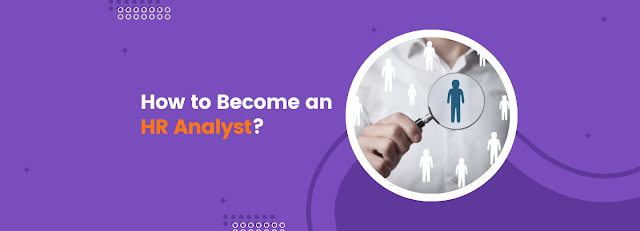How to Become an HR Analyst?
Organizations around the globe have started to understand how data-driven decisions contribute to their growth. But, more than often, data can be daunting, confusing and downright complicated. To help unravel the answers that data holds, there is an increasing need of analysts around the globe. One of the most in-demand skill sets is HR analytics.
An HR analyst plays an important role in gathering, organizing and analyzing
data related to HR operations. The data-driven decisions then play a crucial
role in driving the success of the organization.
In this blog,
you learn the steps to become an HR analyst, including the necessary education,
skills, and training.
Who Is an HR
Analyst?
HR Analysts are specialists
who examine data and figures related to an organization's workforce. They give
businesses data about their employees, such as their performance, compensation,
and benefits. A corporation can increase its profitability and operational
efficiency with the aid of HR analytics. Their function is vital to the
expansion of a business. In order to make sure that everyone is in agreement
and that business procedures are running well, an HR analyst also oversees
interactions between the organization and its personnel.
How Can You
Become an HR Analyst?
Pursue the Right Education for HR Analytics
You don’t need a specific
educational requirement to become an HR Analyst. But, having a good knowledge
in HR, business administration, or related fields can be quite beneficial for
aspirants. Enrolling in an human resource analytics course is a smart step to
take. By getting an HR analytics training, you can gain the knowledge and
skills that are essential for your efficient performance.
Develop Skills for HR Analytics
As the role suggests, it is
pivotal for aspirants to have analytical skills if they want to become a
successful HR Analyst. One needs to understand how to work with data, analyze
trends, and draw insightful conclusions. Take up HR Analytics training to gain
experience in statistics, data analysis, and data visualization. Get familiar
with important analytical tools like Excel and Tableau.
Gain Practical Experience
Having hands-on experience
for a role is quite advantageous. Apart from joining a human resource analytics
course, seek internships, freelance projects, or entry-level positions in the
HR industry. It enables you to make better progress, get valuable real-time
insights, create a network and build a portfolio. All of these will validate
your analytical skills.
Stay Updated on Industry Trends
As the new technologies and
methodologies evolve regularly, so does HR Analytics. An HT aspirant should be
aware of all the trends pertaining to the HR industry. The individual should
also know of the best practices. They should learn about the advancements in HR
analytics by attending workshops, webinars, seminars, or conferences. Becoming
a part of professional associations or online communities for HR professionals
can also help an aspirant tremendously.
Obtain HR Analytics Training Certification
It is not a mandatory
requirement but joining an HR analytics training can validate your expertise to
potential employers. Research a reputable human resource analytics course for
certification and enhance your credibility. Ensure that fundamental topics like
data analysis, predictive modeling, and HR metrics are a part of the
curriculum. You can enroll at MindCypress that offers Human
Resource Analytics Instructor Led Online Training to
learners globally. Since it is an online HR analytics training, you can attend
it from anywhere you wish. You can also try the HR Analytics Professional
(HRAP) or the Certified HR Analyst (CHRA) to validate your skills and knowledge
in HR analytics.
Network with HR Professionals
To advance in HR analytics,
networking is essential. Through professional associations, LinkedIn, and
networking events, establish connections with HR analysts, HR professionals,
and leaders in the field. Establish connections with mentors who may provide
direction, counsel, and career prospects in the HR industry.
Conclusion
You
can start a fulfilling career as an HR analyst by following these guidelines
and making an investment in your education, training, and skill set. HR
analytics offers great potential for growth, influence, and innovation in the
human resources field—whether you're just starting out or looking to move into
a new capacity.
Resource: https://www.mindcypress.com/blogs/human-resource-management/how-to-become-an-hr-analyst

.png)



Comments
Post a Comment